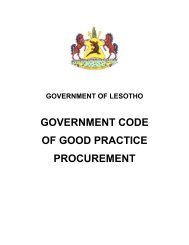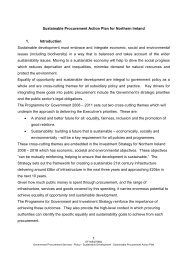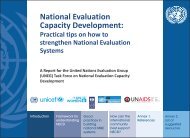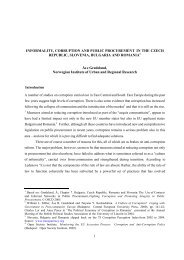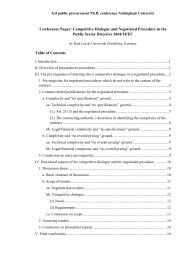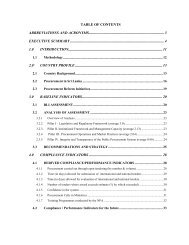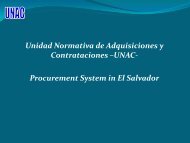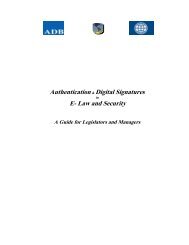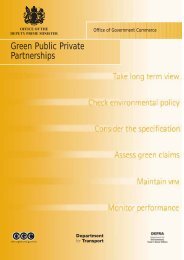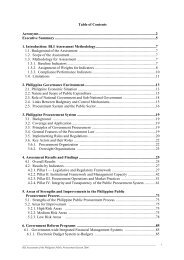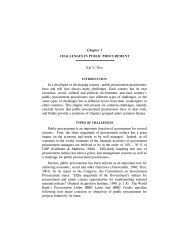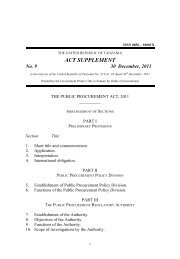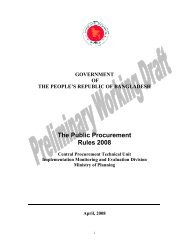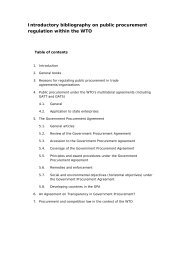Compendium of Country Examples and Lessons Learned from ...
Compendium of Country Examples and Lessons Learned from ...
Compendium of Country Examples and Lessons Learned from ...
You also want an ePaper? Increase the reach of your titles
YUMPU automatically turns print PDFs into web optimized ePapers that Google loves.
Box 8. Validation process in ZambiaAfter having finalized the assessment <strong>of</strong> baseline indicators <strong>and</strong> performance/compliance indicators, theZambia National Tender Board (ZNTB) invited stakeholders to a validation workshop. Eight ministries, the ZambiaNational Farmers Union, Anti Corruption Commission, one supplier <strong>and</strong> one bilateral donor participated.The findings were discussed <strong>and</strong> the topics can be characterized as follows:The stakeholders endorsed the findings as a fair reflection <strong>of</strong> the procurement system in Zambia.Concern on the credibility <strong>of</strong> the sample for the CPIs was raised <strong>and</strong> if it was representative. Thestakeholders were told that the sample was selected on the basis <strong>of</strong> the size <strong>of</strong> the ministries <strong>and</strong> that itincluded both large <strong>and</strong> small ministries <strong>and</strong> provinces.Some ministries were not free to give information because they perceived the exercise to be an audit.Information was only given after reassuring the <strong>of</strong>ficers concerned that the information was to be usedfor purposes <strong>of</strong> the exercise only.Data verification could be a challenge because some <strong>of</strong> the invited representatives <strong>from</strong> civil societywere not ready to provide feedback on some indicators <strong>and</strong> later on participate in the validationprocess.The workshop provided a chance for feedback <strong>from</strong> the participants, for example on how to make therole <strong>of</strong> the Zambia National Tender Board more neutral <strong>and</strong> on private sector problems in respondingto tenders. Follow-up measures were agreed upon.Box 9. Validation process in the PhilippinesThe Philippines implemented the assessment <strong>of</strong> the national procurement system as one activity <strong>of</strong> theCPAR 2006 <strong>and</strong> a follow-up to the 2004 BIS assessment. Agency procurement performance indicators (APPI)were applied to measure performance at the agency level; the assessment <strong>of</strong> the CPIs at the national level iscurrently being undertaken by the Transparency <strong>and</strong> Accountability Network (TAN), a civil society organisation.“The final scores were arrived at after tedious deliberations <strong>of</strong> each <strong>of</strong> the indicators”:The Technical Working Group (TWG) presented the preliminary results <strong>of</strong> the BLI assessment to theInteragency Committee <strong>of</strong> Government Public Procurement Board (GPPB) for initial confirmation <strong>of</strong> the scores.The results <strong>of</strong> the BLI assessment were subsequently discussed at two workshops with the CPAR WorkingGroup. Others involved were ministries, oversight agencies (e.g. Anti-Graft Commission), representatives <strong>of</strong>states <strong>and</strong> municipalities, the Philippine Construction Association <strong>and</strong> Confederation <strong>of</strong> Filipino Consultants, civilsociety organisations such as TAN, Procurement Watch, the Catholic Bishops’ Conference <strong>and</strong> representatives <strong>of</strong>about 10 development partners <strong>and</strong> agencies. The scores were finalized after taking into consideration the finalcomments <strong>of</strong> the World Bank <strong>and</strong> the OECD.If procurement entities do not underst<strong>and</strong> the purpose <strong>of</strong> the assessment or even expect anaudit to be carried out, the collection <strong>of</strong> data for CPIs may be affected. Information sharingneeds to be improved.If reliability or quality <strong>of</strong> data is challenged, high-level government <strong>of</strong>ficials or developmentpartners may question the findings <strong>and</strong> recommendations. A quality assurance mechanismneeds to be established.COMPENDIUM OF COUNTRY EXAMPLES AND LESSONS LEARNED […] - OECD 2008 41



